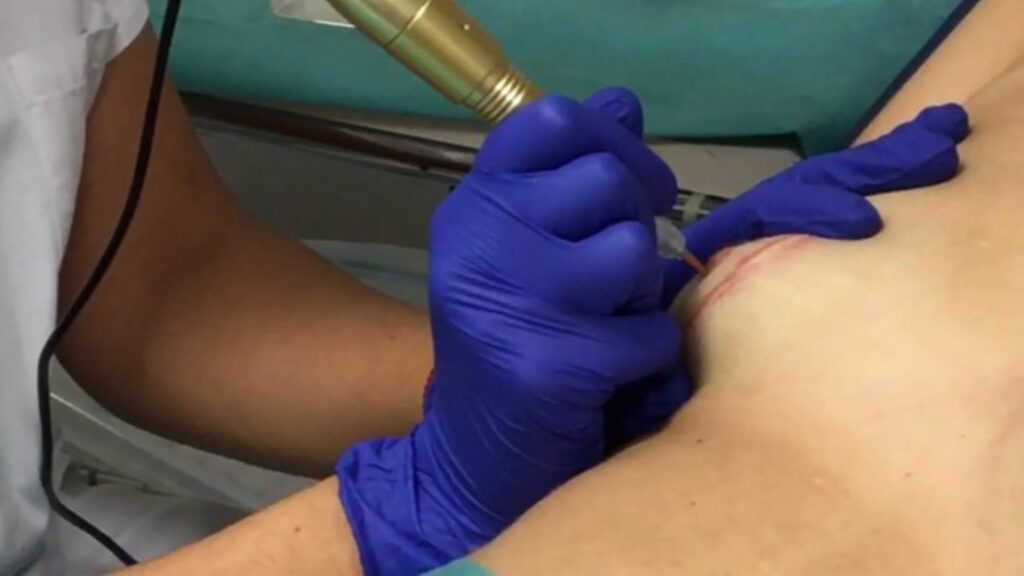Patients undergoing reconstructive breast surgery show a high degree of satisfaction with micropigmentation and surgical reconstruction of the areola and nipple, according to a study led by nursing professionals at Bellvitge University Hospital and the GRIN-IDIBELL nursing research group, published this March in the scientific journal Enfermería Clínica.
This is the first comprehensive study in Spain on the satisfaction of patients undergoing this technique applied to improve self-image and quality of life after breast reconstruction. The work has been led by Anna Padullés, clinical nurse of plastic and reconstructive surgery at the University Hospital of Bellvitge and member of the nursing research group GRIN-IDIBELL.
The study included the opinion of 110 patients treated with micropigmentation after oncological breast reconstruction at the University Hospital of Bellvitge, by means of a satisfaction questionnaire which was carried out two years after the application of the technique.
The average satisfaction with the surgical reconstruction of the areola and nipple was 3.79 on a scale of 1 to 5. 96% considered that the position of the nipple was adequate, although 54.5% stated that the nipple was smaller than expected.
Regarding micropigmentation, satisfaction was 4.4 between 1 and 5. For 97.2% of patients, the size of the areola was correct and for 75.7% the colour was adequate. However, in 91% of the cases they highlighted as a drawback that the colour had faded over time. For this reason, when asked whether they would repeat this technique or opt for a more durable tattoo with permanent ink, 51.4% stated that they would prefer the tattoo. In addition, the study found that the rate of complications was very low.
According to Anna Padullés, the study shows “the high overall satisfaction of the patients for having been able to recover a natural appearance for the whole breast, but without forgetting the relative dissatisfaction with the projection of the nipple and the duration of the colour”. In this respect, she stresses that, although currently in Spain and in most countries pigments are basically used in the medical field, permanent tattooing could be an alternative to be considered. In any case, she concludes, the data that have emerged from the results of this project “open up a new line of research for the nursing profession”.
Micropigmentation (also called dermopigmentation) is a virtually painless procedure, performed by an expert nurse, which contributes to improving the self-esteem, self-image and quality of life of patients. Bellvitge University Hospital was a pioneer in the year 2000 in the implementation of this procedure after breast reconstruction, so it already has more than twenty years of experience. It is currently a benchmark in the whole of Spain for this technique and the hospital provides training in other centres.
It is estimated that more than 5,000 breast cancer surgeries are performed each year in Catalonia, of which 1,500 may require mastectomies and, of these, up to 900 nipple micropigmentations.
The Bellvitge Biomedical Research Institute (IDIBELL) is a biomedical research center created in 2004. It is participated by the Bellvitge University Hospital and the Viladecans Hospital of the Catalan Institute of Health, the Catalan Institute of Oncology, the University of Barcelona and the City Council of L’Hospitalet de Llobregat.
IDIBELL is a member of the Campus of International Excellence of the University of Barcelona HUBc and is part of the CERCA institution of the Generalitat de Catalunya. In 2009 it became one of the first five Spanish research centers accredited as a health research institute by the Carlos III Health Institute. In addition, it is part of the “HR Excellence in Research” program of the European Union and is a member of EATRIS and REGIC. Since 2018, IDIBELL has been an Accredited Center of the AECC Scientific Foundation (FCAECC).

